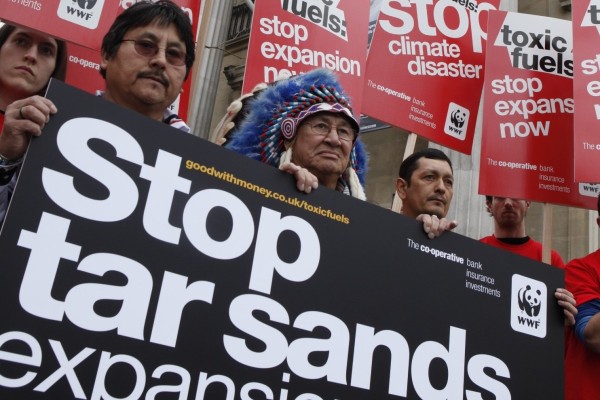Drawing a line in the sand
Plans are afoot for the wholesale ecological reconfiguration of vast parts of the northern hemisphere. The planners are suggesting that infrastructure is required to facilitate far-reaching change: the second-largest dam in the world, a possible nuclear-power station at Peace River, and pipelines across Alberta to the west coast, across the prairies, and down the Mackenzie River. These changes are being drawn up primarily to satisfy the insatiable needs of our neighbours to the immediate south. This current Harper/Stelmach energy sell-out is Phase Two of the selling of Canada initiated by their true predecessor, Brian Mulroney.
Spunky Dominion magazine recently published an extraordinary primer on the tar sands, and, as part of the release of their special issue, ran a conference in Edmonton in which indigenous leaders, ecological activists, academics, elders and students shared knowledge. Their conclusion was that ultimately the tar-sands expansion is naked capitalism at its worst, shrugging off old-growth hunting territories as if they were tattered, worn-out coats.
The people making decisions about tar-sands expansion have one-year (report to shareholders) and four- or five-year (face the people) horizons. This decision will affect future generations of Canadians irrevocably.
The net result will be fewer hunting territories and fewer healthy indigenous communities, and Canadians will have to meet excessive prices for foreign oil to sustain their lifestyles, having sold off our own reserves at bargain-basement prices.
We at CD believe, in contrast, that we should not sacrifice Aboriginal hunting lands, territories with beautiful habitats and rich cultural heritage, on this latest altar to greed. We think it senseless to use up the precious resources of humanity and destroy beautiful and glorious landscapes.
An ecological truism stabs at the heart of capitalist development: A world of infinite consumption and infinite growth can not sustain itself on a planet of finite resources. At an aptly named conference, “Everyone’s Downstream” a variety of chiefs and elders spoke firmly and clearly, saying, “No!” – they do not want a few handouts in exchange for their land base.
Unions were conspicuously absent from the “Everyone’s Downstream” conference, though individual workers spoke poignantly about the banalities, racial tensions and sexual harassment of the tar sands as a workplace. In spite of the fact they will inevitably promote jobs, jobs, jobs – knowing the immediate needs of workers as well as they do – they can divert some resources to sponsoring public discussions and information sessions, thereby simultaneously supporting networking opportunities of the activists.
We need to develop technologies that minimize the ecological footprint; ensure steady production at a rate slow enough that the economic resource value is maximized, and ensure that maximum benefits flow to indigenous users and occupiers of the territories involved.
We ask you to inform yourself about this issue – and, if you are as convinced as we are, to join whatever local chapter of the struggle against it exists in your community. Canada must not allow itself to become a wasteland-like battery that powers our imperial neighbour’s mindless addiction.
Once again, indigenous peoples are on the front line of the struggle against capitalism.
This article appeared in the Indigenous Lands and Rights issue of Canadian Dimension .









